Description
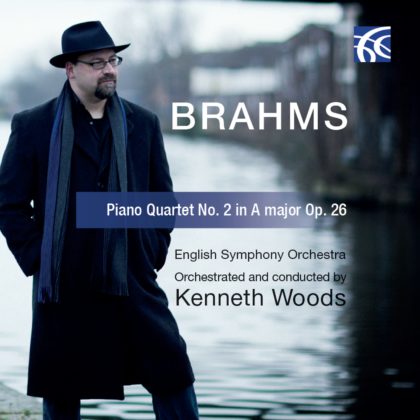
Conceived in a moment of sudden inspiration while teaching in Italy, Kenneth Woods’ orchestration of Brahms’ most expansive chamber work is the product of a life-long immersion in the music of this great composer as both cellist and conductor. This is a work of symphonic scope, realised here as an orchestral score that fully inhabits the soundworld of its composer as a work worthy of sitting along side his four numbered symphonies.
One of The Arts Desk’s Ten Best Classical CDs of 2018: “Kenneth Woods’s idiomatic orchestration of Brahms’s Piano Quartet No. 2 (Nimbus) proved a must-hear, a useful corrective to Schoenberg’s OTT transcription of the G minor quartet.” Graham Rickson
“Hopefully this new addition to the Brahms symphonic canon will get the widespread dissemination it certainly deserves… Kenneth Woods has grasped this nettle and produced an absolutely imaginative arrangement.” Erik Levi, BBC Music Magazine
“By the time the work concludes, one has forgotten that the composer intended the music for a quartet. In essence, Woods has created a new Brahms Fifth Symphony.” John J. Puccio, Classical Candor
“Woods’ versatile English Symphony Orchestra respond with energy and warmth, and it’s fun to compare their rich sound with the Scottish Chamber Orchestra on Robin Ticciati’s recent set of the symphonies. This quartet is an early, extrovert piece and Woods taps into the music’s unbuttoned joy. The first movement’s close is a case in point, a cheery, affirmative musical hug, pitched to perfection in this performance. Depths are plumbed in Brahms’s “Poco Adagio”, and the scherzo’s ingenuity shines through. And while the G minor quartet finishes with a blaze of nihilistic fury, this one ends in a blaze of brassy sunlight. All fascinating – a labour of love, handsomely recorded with decent notes…. He’s effectively given us an additional Brahms symphony.” Graham Rickson, The Arts Desk
“Best of all, however, is the new Nimbus recording…especially as the orchestration is more idiomatic than Schoenberg’s…and it receives a persuasive and enjoyable performance from the English Symphony Orchestra directed by the arranger… you would need the Berlin or Vienna Phil to do much better…the sound quality, coupled with an informative set of notes from Woods, detailing the gestation of the orchestration, rounds off a release recommendable in every respect.” Brian Wilson, MusicWeb International
“The result is gorgeous and the scoring unmistakably evokes the end of the slow movement of the First Symphony… In the Scherzo it seems to me that the melodic lines sound just right on whichever instrument Woods chooses to use, whether that be flute, clarinet, violins in unison with a horn, or whatever other choice is made. In the vigorous Trio I like the prominence given to the horn section; that adds a fair degree of backbone to the instrumental palette. The horns also make an important contribution to the finale or, rather, to the boisterous, high spirited episodes. Elsewhere, the more lyrical sections are pleasingly scored in a way that emphasises the contrast with the spirited passages of music. It seems to me that this vivacious finale is painted by Woods in authentic Brahmsian colours. The ending is especially exuberant, reminding me irresistibly of the conclusion to the Second Symphony. As you’ll have gathered, I think Kenneth Woods has made a notable job of orchestrating this important chamber piece.This is a disc which Brahmsian collectors should hear. It presents one of his chamber masterpieces in a new and completely sympathetic light.” John Quin, MuiscWeb International
“With Kenneth Woods conducting there can be no doubt that his intentions are fully revealed, certainly with excellent playing and a clear recording… Wood’s achievement, made over several years and then revised in time for this recording, is considerable and imaginative, and should appeal to open-minded Brahms-lovers…Thus the opening, and arresting, opening is for horns, very Brahmsian, yet the mind leaps to Schumann (his Opus 86 Konzertstück for those instruments), and for all that the expansive exposition (duly repeated) has in Woods’s tints allusions to Brahms’s Opus 11 Serenade….the large-scale opening movement (seventeen minutes) takes on the mantle of a heroic tale, a forest legend. The Adagio includes ominous growly brass, a sinister sound amidst mellifluous lyricism – there is always the sense that the music is about something (Hansel and Gretel meeting the Witch), not least when an impassioned climax is reached. The Scherzo (if more an intermezzo) could now be credited to Dvořák, nothing wrong with that, with elements of outdoors and folksiness, veiled emotions too, with greater (Slavonic Dance) exuberance emerging, and the Finale has a Sullivan-esque pace and skip, at least until the heavier-hearted second subject arrives.” Colin Anderson, ClassicalSource
“This is a very joyous disc: sonorous, exuberant and expansive, and wonderfully evocative of the then-youthful Brahms….’… this is an excellent performance representing a useful, joyful and even inspired addition to the orchestral repertoire.'” Alice McVeigh, MV Daily
“Because anyone familiar with the four symphonies will recognize where Woods is directly echoing Brahms’s orchestration, he is actually more successful at replacing the piano than Schoenberg was. We feel firmly and authentically in Brahms’s sound world. The primary parallel, to my ear, is with the Second Symphony and the Serenades mentioned above… But I came away feeling that Woods has done something both enjoyable and idiomatic… Nimbus’s recorded sound is all that it should be, as are the program notes and the extended essay by Woods on his orchestration. Warmly recommended.” Huntley Dent, Fanfare
“Kenneth Woods always keeps Brahms’s orchestra in mind, and the result is a version of the work that, with a few minor exceptions, could easily be mistaken for an arrangement by Brahms himself. Woods evidently has a keen understanding both of the quartet and of Brahms’s orchestral practice, but he also demonstrates an impressive discipline in keeping this large-scale music within the Classically proportioned orchestral framework that Brahms would have favoured…The performance, by the English Symphony Orchestra under Woods himself, is excellent.” Gavin Dixon, Fanfare, Classical CD Reviews
“In every respect, this is a fine achievement, which deserves a place as a classical next to the original version. It preserves Brahms’s Romantic trait and, without wandering off the path of the original composition, it adds many evocative elements to which only an orchestra can give prominence and that an excellent performance as the one recorded here further enhances. The English Symphony Orchestra plays with stylishness and its sound is bright, perfectly captured by the engineering. Its colours are shimmering and precious and in several passages different instruments (especially woodwinds) play embellishments of commendable beauty. The playing is smooth, remarkable especially for the white hot sound of the brasses and for the silkiness of the strings. Under Woods’s baton, the music flows with brilliance and in a lean way… coloured by an incredible range of emotional subtlety…” Astrid Iustulin,The Music Gala
“Woods has orchestrated Brahms’s Second Piano Quartet Op. 26 to create what’s effectively a completely new Brahms symphony…Any Brahms lover would be fascinated to hear this orchestration…”
Richard Bratby. The Birmingham Post
“In his Brahms arrangement, Woods proves to be a master orchestrator, delivering a score of wide-ranging expression and colour…Woods brings glorious warmth to Opus 26, and this could well pass as an original Brahms orchestral score…one which will for sure in the future delight audiences everywhere.” Adrian Williams. Classical Source
“…highly recommended…great personality…a spectacular result… Kenneth Woods is a creator.” Carme Miró, Sonograma Magazine
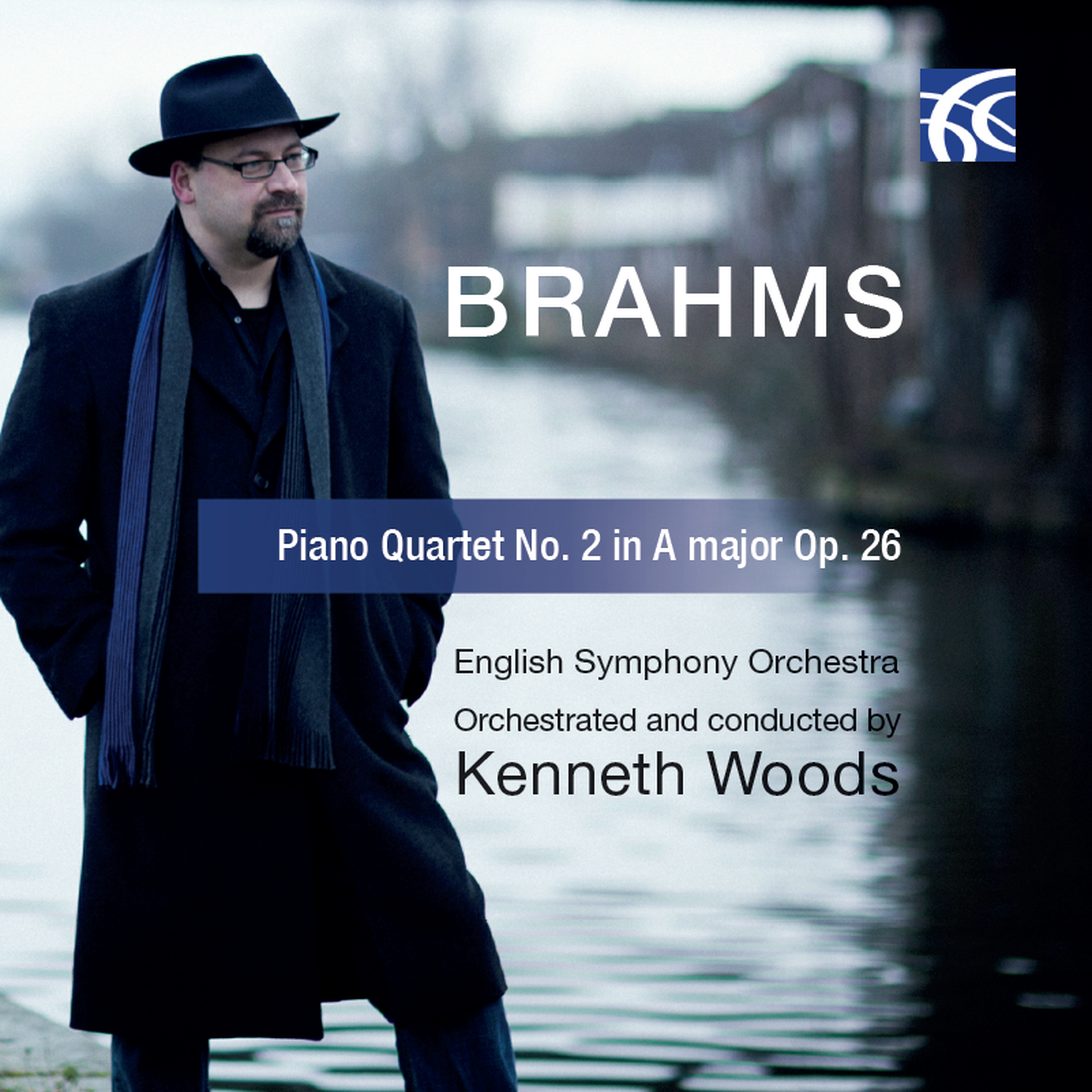
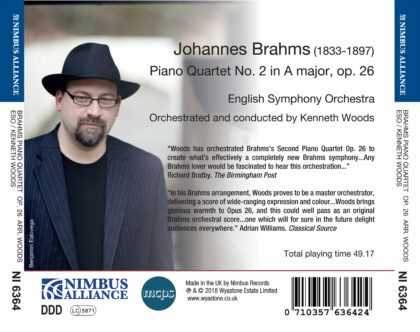

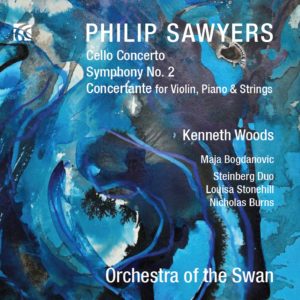
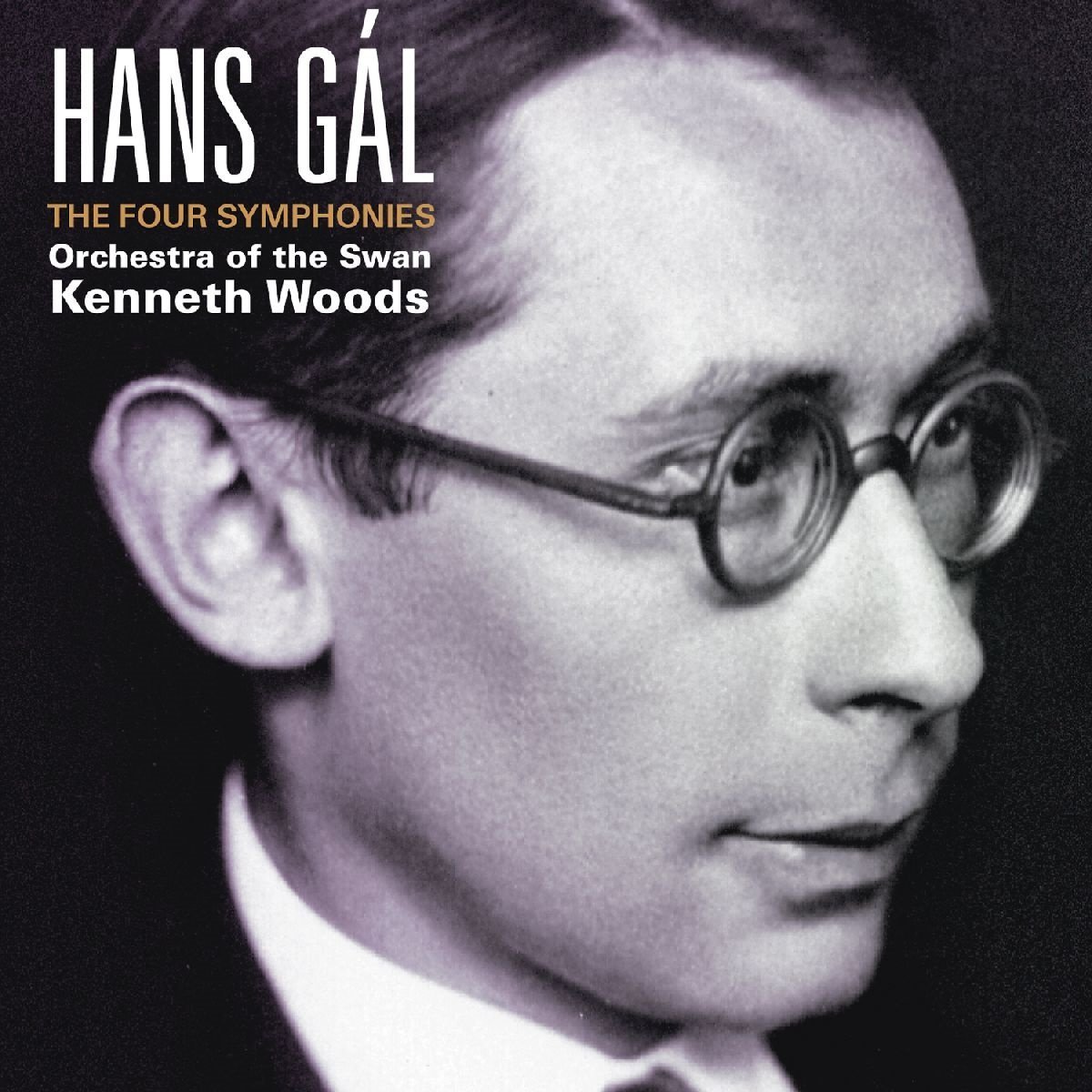
Reviews
There are no reviews yet.